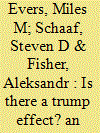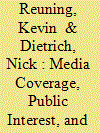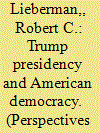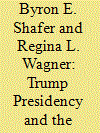|
|
|
Sort Order |
|
|
|
Items / Page
|
|
|
|
|
|
|
| Srl | Item |
| 1 |
ID:
165863


|
|
|
|
|
| Summary/Abstract |
It is commonplace to equate the arrival of a new conservative administration in Washington, DC, with the “rolling back” of the federal activities. We disagree with this conventional perspective, and seek to demonstrate that the equation of conservative Republicanism and retrenchment elides a critical change in the relationship between party politics and State power—a relationship that Donald Trump seems determined to nurture. Drawing on primary research, we argue that partisanship in the United States is no longer a struggle over the size of the State; rather it is a contest to control national administrative power. Since the late 1960s, conservative administrations have sought to redeploy rather than dismantle or roll back state power. Through “redeployment,” conservative presidents have sustained previous levels of State spending or State activity, but in a way reflecting a new administration’s ideology.
|
|
|
|
|
|
|
|
|
|
|
|
|
|
|
|
| 2 |
ID:
165861


|
|
|
|
|
| Summary/Abstract |
We explore what can be learned from authoritarian backsliding in middle income countries about the threats to American democracy posed by the election of Donald Trump. We develop some causal hunches and an empirical baseline by considering the rise of elected autocrats in Venezuela, Turkey, and Hungary. Although American political institutions may forestall a reversion to electoral autocracy, we see some striking parallels in terms of democratic dysfunction, polarization, the nature of autocratic appeals, and the processes through which autocratic incumbents sought to exploit elected office. These processes could generate a diminished democratic system in which electoral competition survives, but within a political space that is narrowed by weakened horizontal checks on executive power and rule of law.
|
|
|
|
|
|
|
|
|
|
|
|
|
|
|
|
| 3 |
ID:
165858


|
|
|
|
|
| Summary/Abstract |
Debates over the extent to which racial attitudes and economic distress explain voting behavior in the 2016 election have tended to be limited in scope, focusing on the extent to which each factor explains white voters’ two-party vote choice. This limited scope obscures important ways in which these factors could have been related to voting behavior among other racial sub-groups of the electorate, as well as participation in the two-party contest in the first place. Using the vote-validated 2016 Cooperative Congressional Election Survey, merged with economic data at the ZIP code and county levels, we find that racial attitudes strongly explain two-party vote choice among white voters—in line with a growing body of literature. However, we also find that local economic distress was strongly associated with non-voting among people of color, complicating direct comparisons between racial and economic explanations of the 2016 election and cautioning against generalizations regarding causal emphasis.
|
|
|
|
|
|
|
|
|
|
|
|
|
|
|
|
| 4 |
ID:
165862


|
|
|
|
|
| Summary/Abstract |
Does President Trump face domestic costs for foreign policy inconsistency? Will co-partisans and opposition-partisans equally punish Donald Trump for issuing flippant international threats and backing down? While the president said he could “stand in the middle of Fifth Avenue and shoot somebody” without losing voters, the literature consistently shows that individuals, regardless of partisanship, disapprove of leaders who jeopardize the country’s reputation for credibility and resolve. Given the atypical nature of the Trump presidency, and the severe partisan polarization surrounding it, we investigate whether the logic of audience costs still applies in the Trump era. Using a unique experiment fielded during the 2016 presidential transition, we show that Republicans and Democrats impose equal audience costs on President Trump. And by varying the leader’s identity, between Donald Trump, Barack Obama, and “The President,” we demonstrate that the public adheres to a non-partisan logic in punishing leaders who renege on threats. Yet we also find Presidents Trump and Obama can reduce the magnitude of audience costs by justifying backing down as being “in America’s interest.” Even Democrats, despite their doubts of Donald Trump’s credibility, accept such justifications. Our findings encourage further exploration of partisan cues, leader-level attributes, and leader-level reputations.
|
|
|
|
|
|
|
|
|
|
|
|
|
|
|
|
| 5 |
ID:
165856


|
|
|
|
|
| Summary/Abstract |
Donald Trump’s success in the 2016 presidential primary election prompted scrutiny for the role of news media in elections. Was Trump successful because news media publicized his campaign and crowded out coverage of other candidates? We examine the dynamic relationships between media coverage, public interest, and support for candidates in the time preceding the 2016 Republican presidential primary to determine (1) whether media coverage drives support for candidates at the polls and (2) whether this relationship was different for Trump than for other candidates. We find for all candidates that the quantity of media coverage had significant and long-lasting effects on public interest in that candidate. Most candidates do not perform better in the polls following increases in media coverage. Trump is an exception to this finding, receiving a modest polling bump following an increase in media coverage. These findings suggest that viability cues from news media contributed to Trump’s success and can be influential in setting the stage in primary elections.
|
|
|
|
|
|
|
|
|
|
|
|
|
|
|
|
| 6 |
ID:
165860


|
|
|
|
|
| Summary/Abstract |
Did the election of Donald Trump affect the popularity of the European Union (EU) in Europe? Theoretically, both a positive rally effect (due to a perceived external threat) and a negative domino effect (due to resignation among Europhiles and/or reinforcement among europhobe nationalists) are plausible. We treat Trump’s unexpected victory as an external shock and use a Eurobarometer survey that was conducted in all EU-28 member states four days prior to (control group) and six days after the election (treatment group) as source material for a natural experiment. The analysis reveals that the election of Trump caused a significant increase in the EU’s popularity in Europe immediately after the election. This “Trump effect” is considerable in size, roughly equivalent to three years of education. Gains in popularity were particularly high among respondents who perceived their country as economically struggling and, surprisingly, among the political right, suggesting that Trump’s victory broadened and ideologically diversified the EU’s base of support.
|
|
|
|
|
|
|
|
|
|
|
|
|
|
|
|
| 7 |
ID:
165864


|
|
|
|
|
| Summary/Abstract |
To many observers across the political spectrum, American democracy appears under threat. What does the Trump presidency portend for American politics? How much confidence should we have in the capacity of American institutions to withstand this threat? We argue that understanding what is uniquely threatening to democracy requires looking beyond the particulars of Trump and his presidency. Instead, it demands a historical and comparative perspective on American politics. Drawing on insights from the fields of comparative politics and American political development, we argue that Trump’s election represents the intersection of three streams in American politics: polarized two-party presidentialism; a polity fundamentally divided over membership and status in the political community, in ways structured by race and economic inequality; and the erosion of democratic norms. The current political circumstance threatens the American democratic order because of the interactive effects of institutions, identity, and norm-breaking.
|
|
|
|
|
|
|
|
|
|
|
|
|
|
|
|
| 8 |
ID:
165857


|
|
|
|
|
| Summary/Abstract |
How much of politics is specific to its actors and how much is the reflection of an established structure is a perennial concern of political analysts, one that becomes especially intense with the candidacy and then the presidency of Donald Trump. In order to have a template for assigning the outcomes of politics to structure rather than idiosyncrasy, we begin with party balance, ideological polarization, substantive content, and a resulting process of policy-making drawn from the immediate postwar period. The analysis then jumps forward with that same template to the modern world, dropping first the Trump candidacy and then the Trump presidency into this framework. What emerges is a modern electoral world with increased prospects for what might be called off-diagonal candidacies and a policy-making process that gathers Bill Clinton, George W. Bush, Barack Obama, and Donald Trump together as the modern presidents.
|
|
|
|
|
|
|
|
|
|
|
|
|
|
|
|
| 9 |
ID:
165859


|
|
|
|
|
| Summary/Abstract |
Guided by the thesis that fascism was the outcome of a dialectic of instrumental reason, I argue that Trumpism is the result of a dialectic of neoliberal reason. The 2008 crisis revealed that widely distributed consumption could no longer be sustained through escalating debt, as it had been since neoliberalizing reforms in the 1970s. Economic crisis has been interpreted through a culture market in which pseudo-individual consumers choose what hyperreal public they prefer and participate in pseudo-activity through social media. Retreat into insular hyperrealities and hostility to dissonant alternatives reinforce each other in an escalating logic generating partisan incivility and fake news. The de-democratization of the state through subservience to private interests and political dysfunction has combined with the consumer’s uncompromising mentality as a dissatisfied customer to channel politicization into populism. It aggregates negatively through shared dissatisfaction, driving escalating antagonism between technocratic responsibility and populist responsiveness. These escalating economic, cultural, and political contradictions heighten negative “freedom from” restraints while subverting positive “freedom to” relate meaningfully to the world. This intensifies anxieties and receptivity to authoritarianism as a self-defeating escape from neoliberal freedom. Trumpism exploits precarity, corrupts democratic norms, and licenses misdirected aggression. This neoliberal authoritarianism is inverted fascism. Trump’s presidency is more effect than cause.
|
|
|
|
|
|
|
|
|
|
|
|
|
|
|
|
|
|
|
|
|